FXON services will be temporarily suspended due to phased system upgrades and a platform redesign. (Details here)
FXON services will be temporarily suspended due to a full platform redesign. (Details here)
- Features
-
Services/ProductsServices/ProductsServices/Products

Learn more about the retail trading conditions, platforms, and products available for trading that FXON offers as a currency broker.
You can't start without it.
Trading Platforms Trading Platforms Trading Platforms
Features and functionality comparison of MetaTrader 4/5, and correspondence table of each function by OS
Two account types to choose
Trading Account Types Trading Account Types Trading Account Types
Introducing FXON's Standard and Elite accounts.
close close

-
SupportSupportSupport

Support information for customers, including how to open an account, how to use the trading tools, and a collection of QAs from the help desk.
Recommended for beginner!
Account Opening Account Opening Account Opening
Detailed explanation of everything from how to open a real account to the deposit process.
MetaTrader4/5 User Guide MetaTrader4/5 User Guide MetaTrader4/5 User Guide
The most detailed explanation of how to install and operate MetaTrader anywhere.
FAQ FAQ FAQ
Do you have a question? All the answers are here.
Coming Soon
Glossary Glossary GlossaryGlossary of terms related to trading and investing in general, including FX, virtual currencies and CFDs.
News News News
Company and License Company and License Company and License
Sitemap Sitemap Sitemap
Contact Us Contact Us Contact Us
General, personal information and privacy inquiries.
close close

- Promotion
- Trader's Market
- Partner
-
close close
Learn more about the retail trading conditions, platforms, and products available for trading that FXON offers as a currency broker.
You can't start without it.
Features and functionality comparison of MetaTrader 4/5, and correspondence table of each function by OS
Two account types to choose
Introducing FXON's Standard and Elite accounts.
Support information for customers, including how to open an account, how to use the trading tools, and a collection of QAs from the help desk.
Recommended for beginner!
Detailed explanation of everything from how to open a real account to the deposit process.
The most detailed explanation of how to install and operate MetaTrader anywhere.
Do you have a question? All the answers are here.
Coming Soon
Glossary of terms related to trading and investing in general, including FX, virtual currencies and CFDs.
General, personal information and privacy inquiries.
Useful information for trading and market information is posted here. You can also view trader-to-trader trading performance portfolios.
Find a trading buddy!
Share trading results among traders. Share operational results and trading methods.
- Legal Documents TOP
- Client Agreement
- Risk Disclosure and Warning Notice
- Order and Execution Policy
- Complaints Procedure Policy
- AML/CFT and KYC Policy
- Privacy Policy
- eKYC Usage Policy
- Cookies Policy
- Website Access and Usage Policy
- Introducer Agreement
- Business Partner Agreement
- VPS Service Terms and Condition

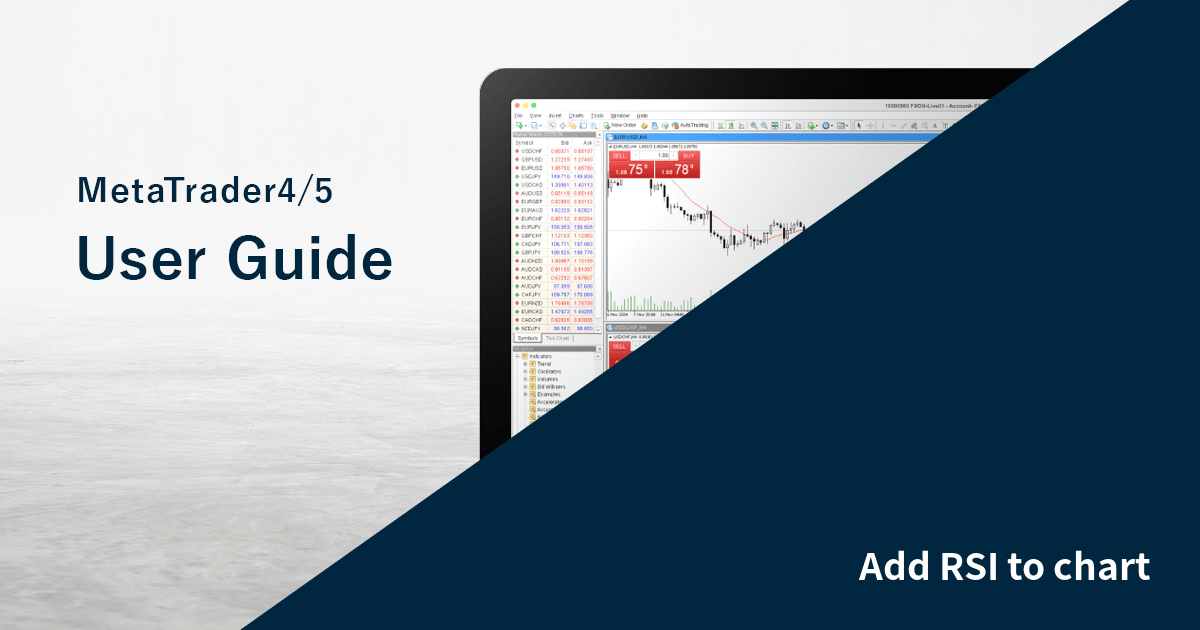
This article was :
published
updated
In MetaTrader 4 (MT4) and MetaTrader 5 (MT5), you can display the Relative Strength Index (RSI), a technical indicator developed by J.W. Wilder. The RSI evaluates overbought or oversold conditions based on price movements.
Here we will look at how to add RSI to a chart on MT4/MT5.
Switch between MT4/MT5 tabs to check the steps for each.
Step 1
RSI can be set up from the menu or the Navigator.
Add RSI from the menu
Click "Insert" in the menu. Hover the pointer over "Indicators" > "Oscillators" and select "Relative Strength Index".
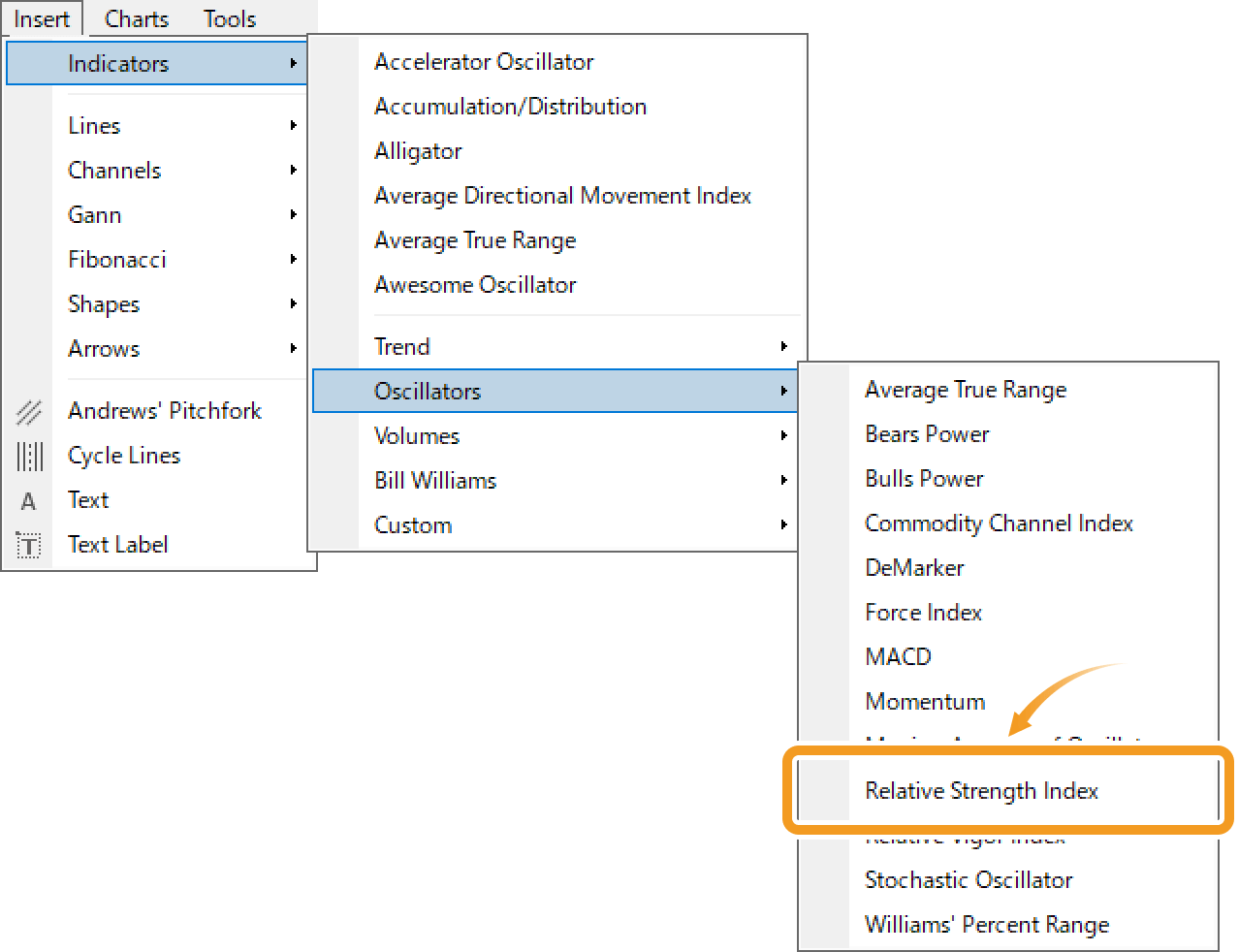
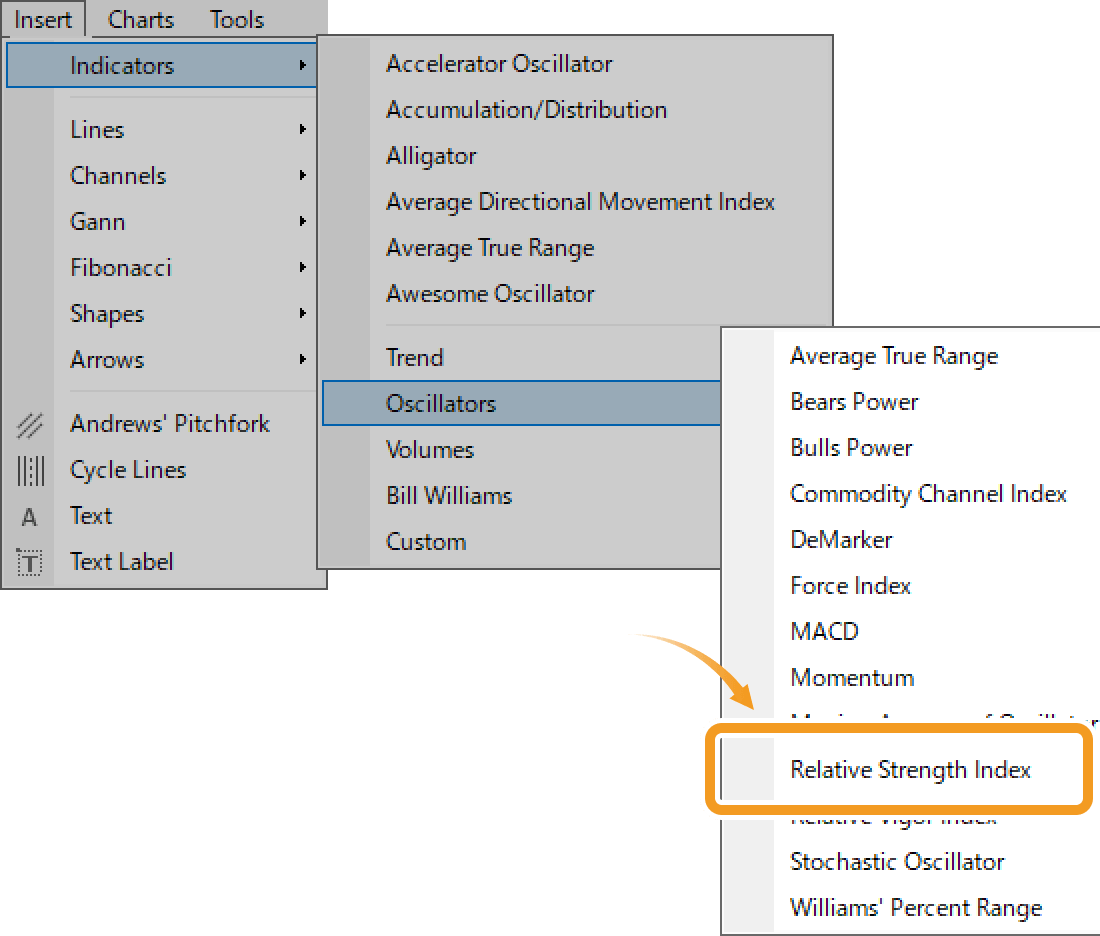
Add RSI from the Navigator
On the Navigator, click on the "+" signs next to "Indicators" and then "Oscillators". Select "Relative Strength Index" and drag it onto the chart you wish to apply it to.
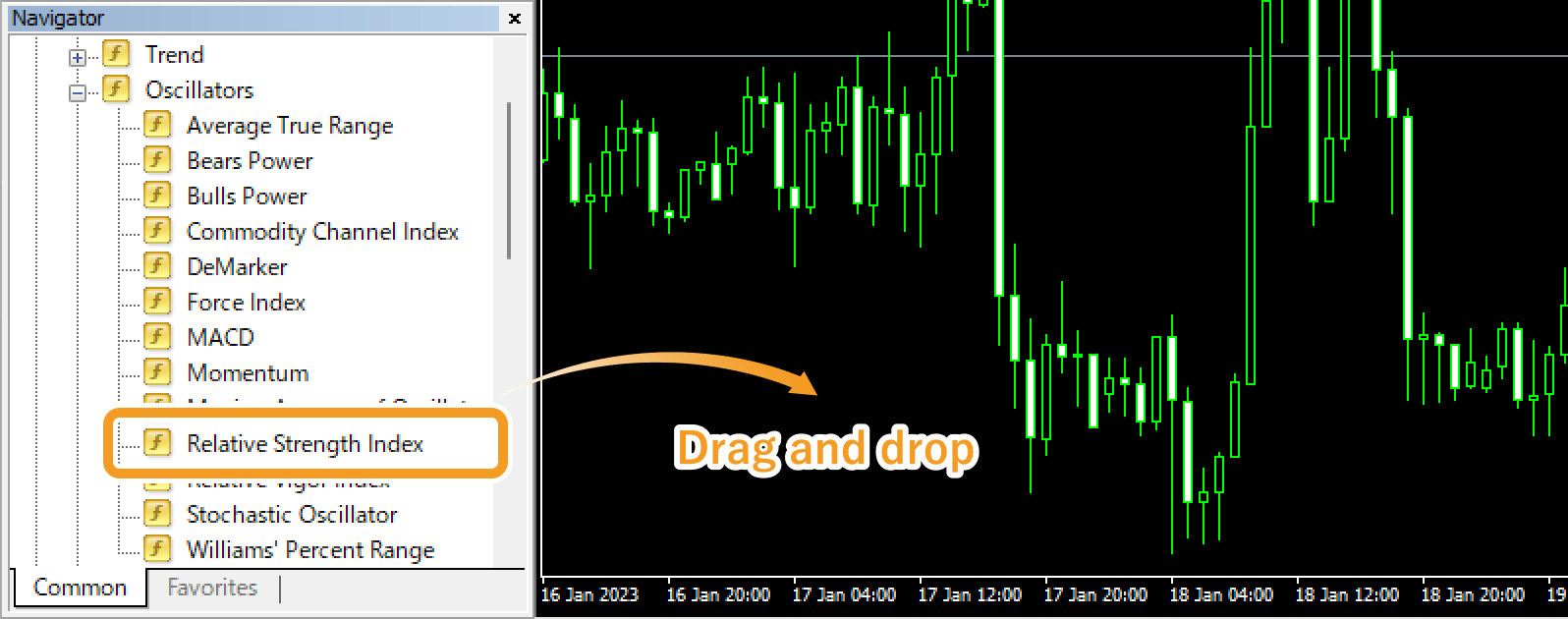
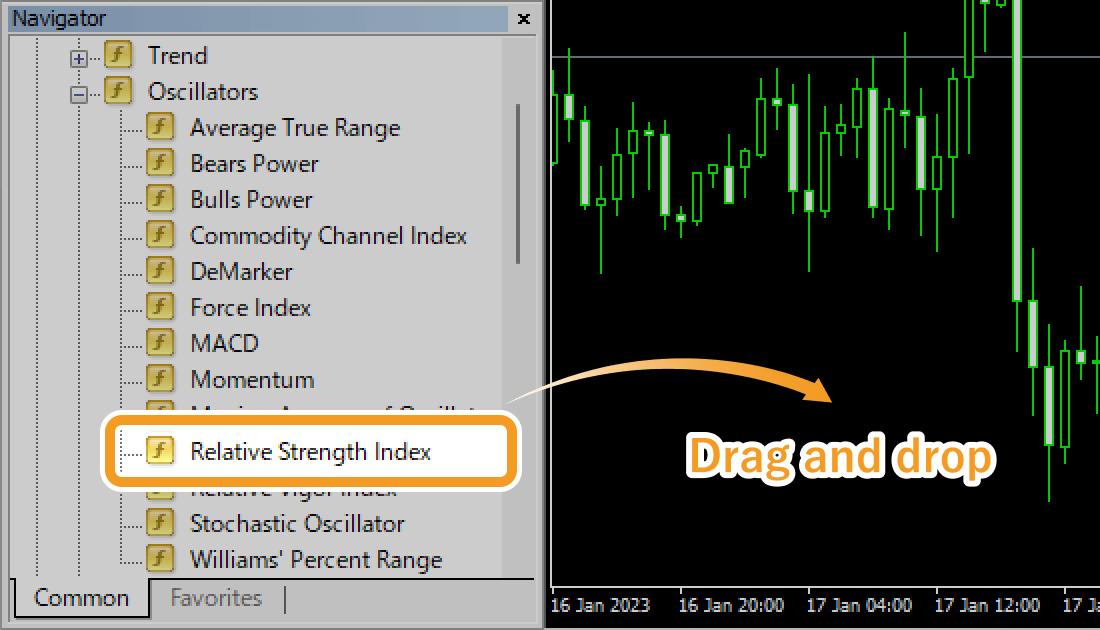
Or, right-click on "Relative Strength Index" and select "Attach to a chart".
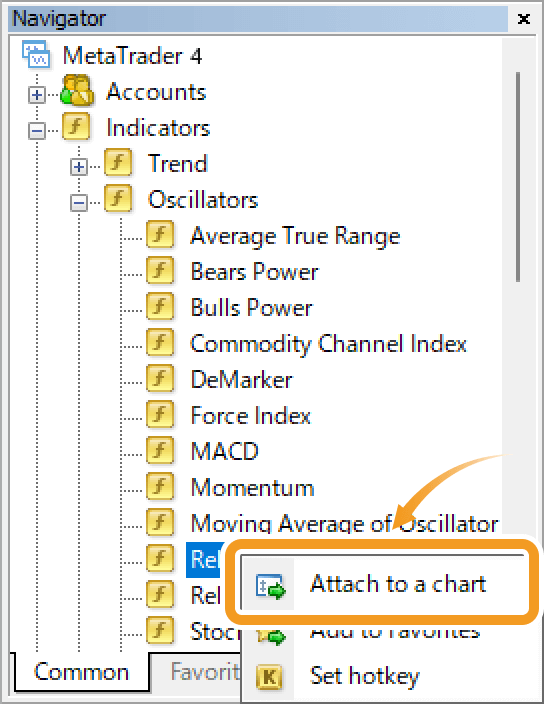
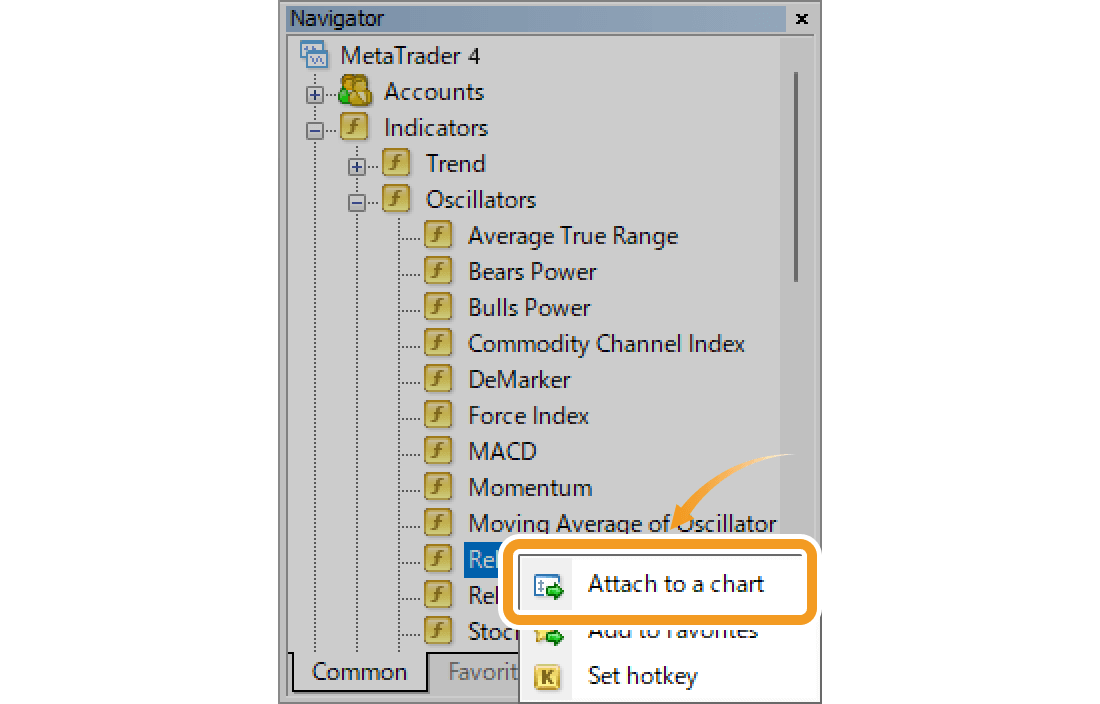
Step 2
The setting window for RSI will appear. Set the parameters in the "Parameters", "Levels", and "Visualization" tabs and click "OK".
"Parameters" tab
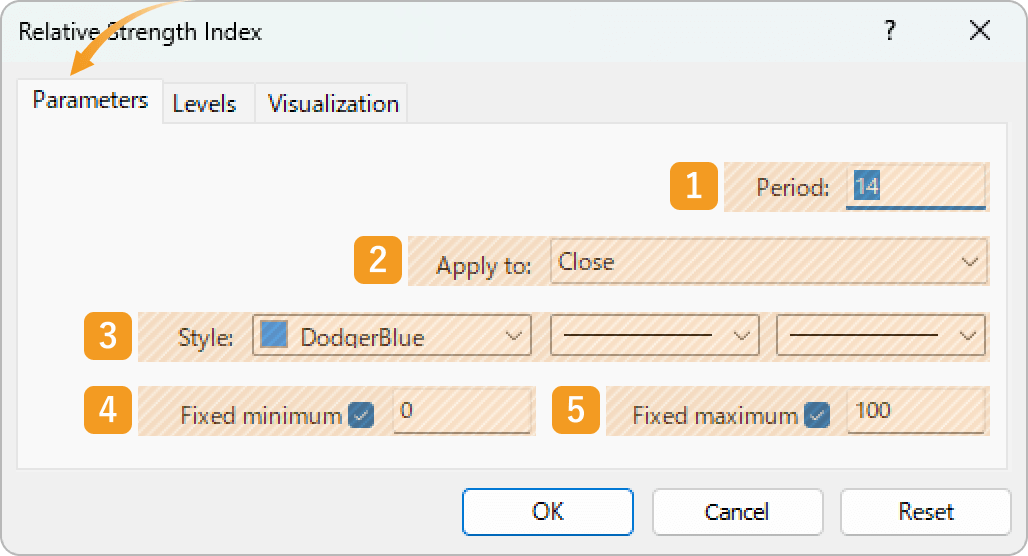
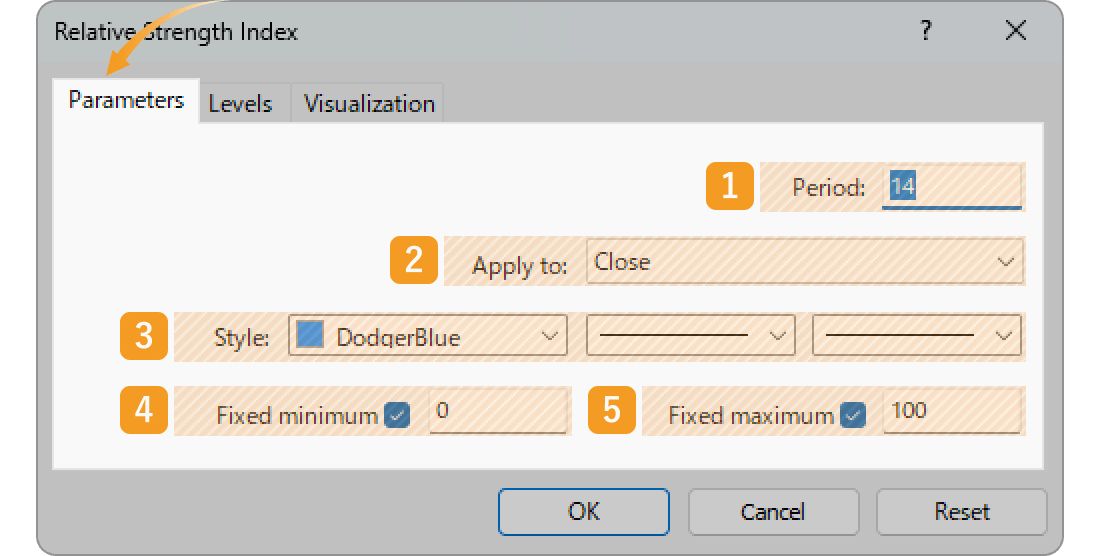
|
Number |
Item name |
Descriptions |
|---|---|---|
|
1 |
Period |
Set the period for the RSI. The unit here is the number of candlesticks. If you select the daily chart and set it to "14", the RSI for the past 14 days will be generated. |
|
2 |
Apply to |
Price to use for calculating RSI. Close: close price Open: open price High: high price Low: low price Median Price (HL/2): (high price + low price) ÷2 Typical Price (HLC/3): (high price + low price + close price) ÷3 Weighted Close (HLCC/4): (high price + low price + close price×2) ÷4 Previous Indicator's Data: the value of the indicator displayed last First Indicator's Data: the value of the indicator displayed first |
|
3 |
Style |
Set the color, line type, and line thickness for RSI. |
|
4 |
Fixed minimum |
Set the minimum value of the RSI in the sub-window. |
|
5 |
Fixed maximum |
Set the maximum value of the RSI in the sub-window. |
Among the options in the "Apply to" field, "Previous Indicator's Data" and "First Indicator's Data" use the values of an indicator displayed in a sub-window, rather than the price of the chart's symbol.
For example, if volume is shown as the first indicator in a sub-window and you select First Indicator's Data, the RSI will be calculated based on the volume.
On MT4, these options remain visible even when not available, but if selected in such cases, they will automatically default to Close.
"Levels" tab
IIn the RSI sub-window, you can display horizontal lines at given levels. They are set to 30% and 70% by default. If you wish to change them, double-click the numbers and enter the number of your choice. If you want to add another horizontal line, click "Add" and enter the number. RSI fluctuates from 0~100% so pick a number from 0~100.
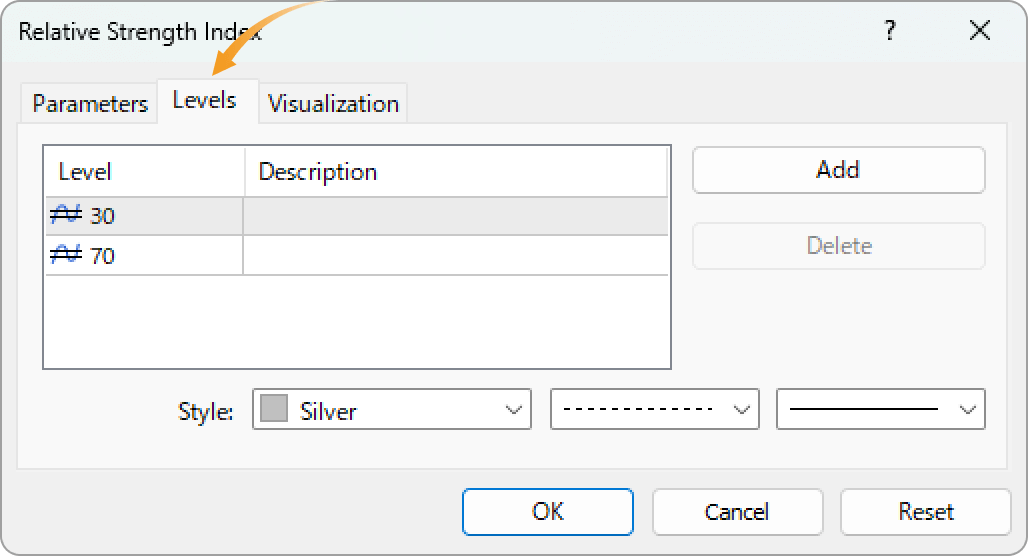
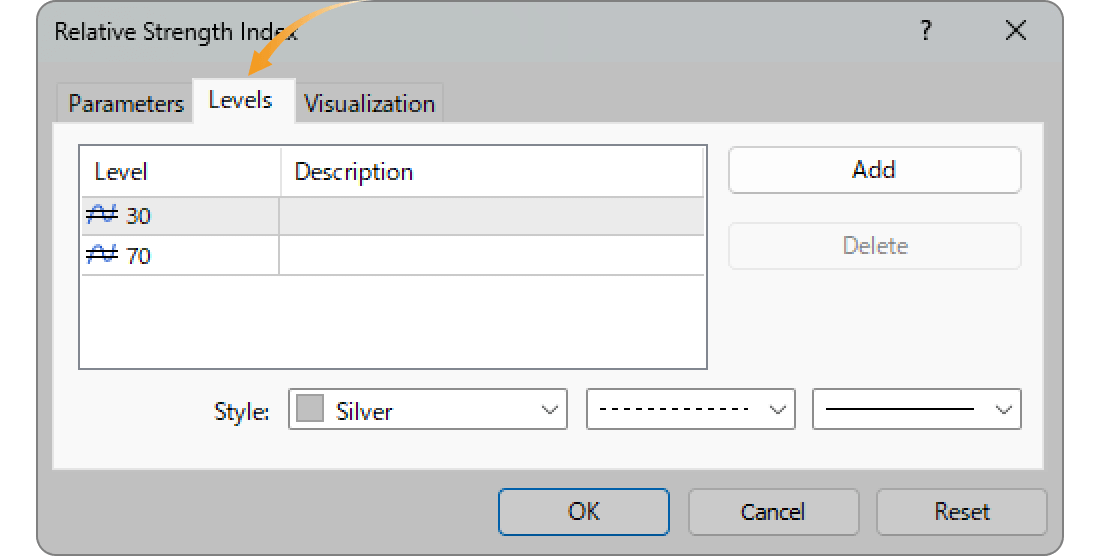
"Visualization" tab
In the "Visualization" tab, you can set the timeframes to display RSI. As RSI can only be displayed in the sub-window, it will be displayed in the sub-window even if "Show in the Data Window" is unchecked.
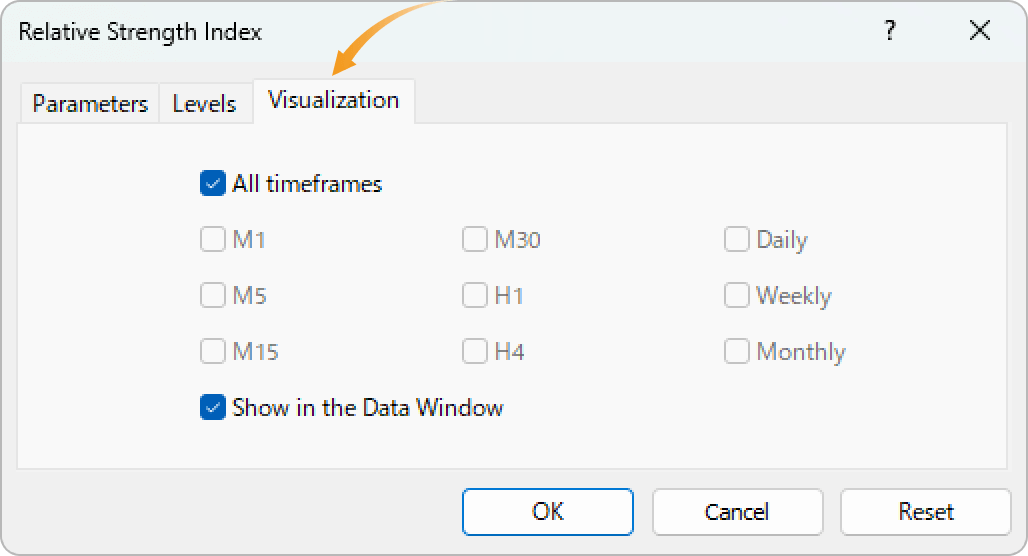
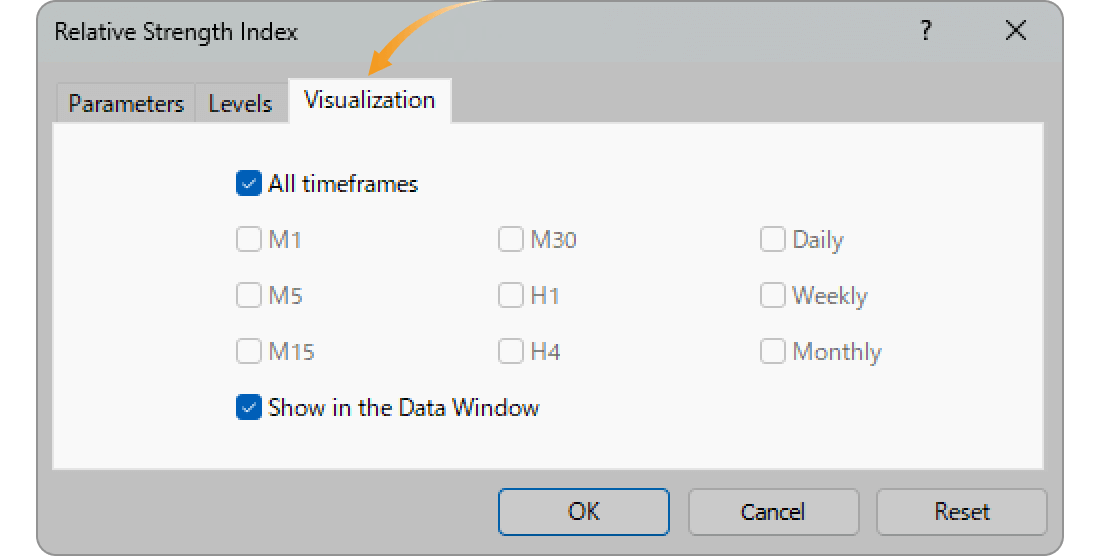
Step 3
RSI will be displayed on the sub-window of the chart.
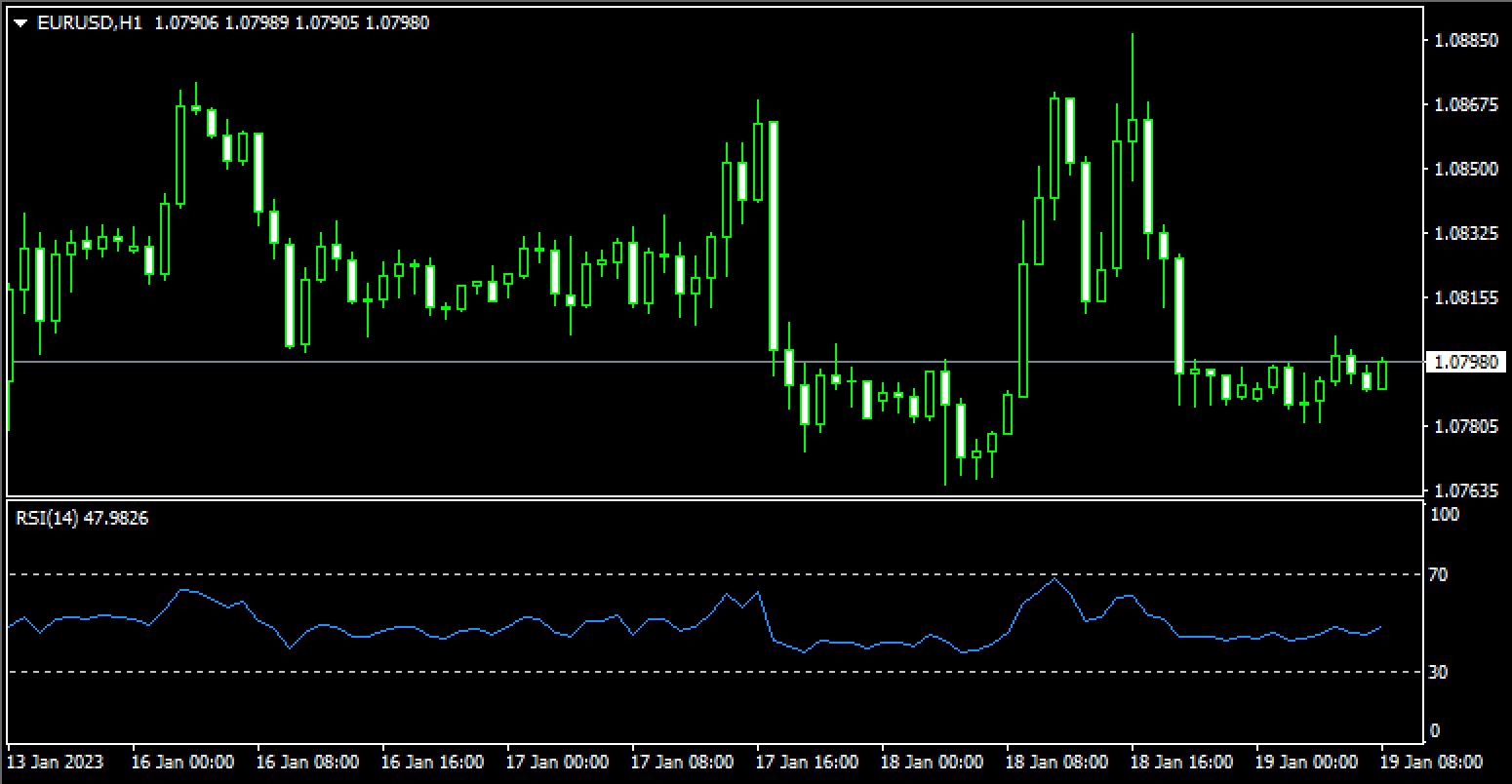
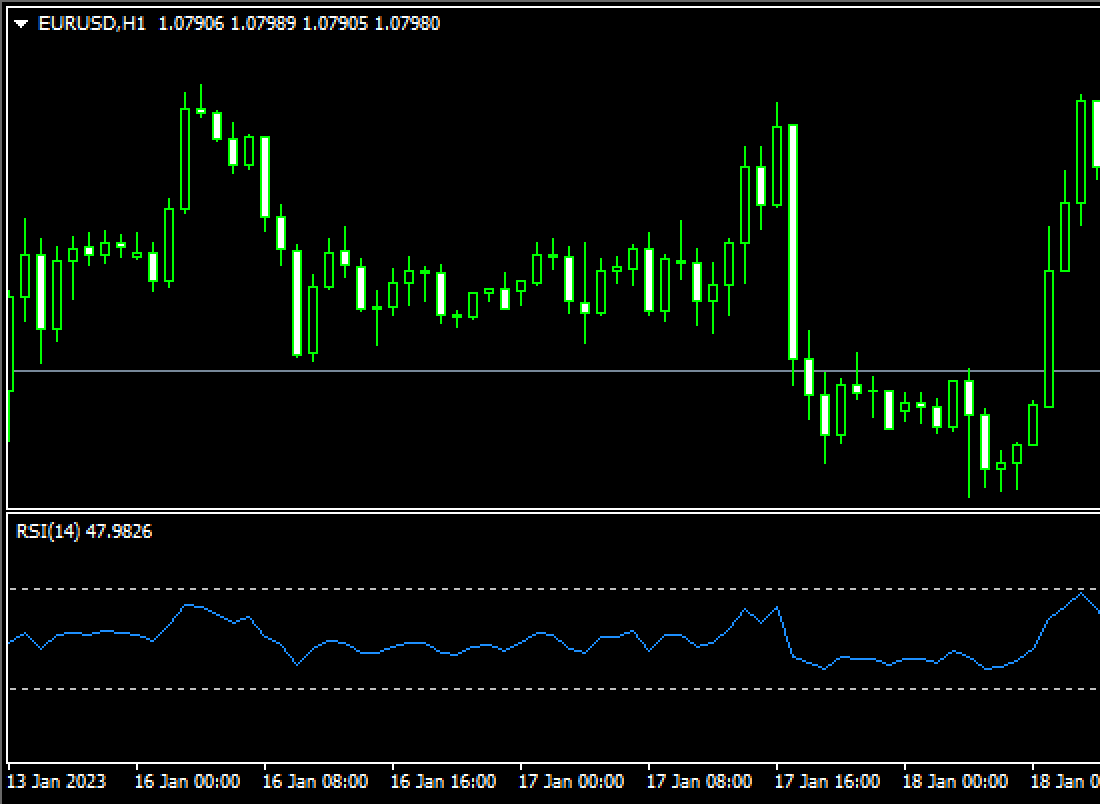
Step 1
RSI can be set up from the menu or the Navigator.
Add RSI from the menu
Click "Insert" in the menu. Hover the pointer over "Indicators" > "Oscillators" and select "Relative Strength Index".
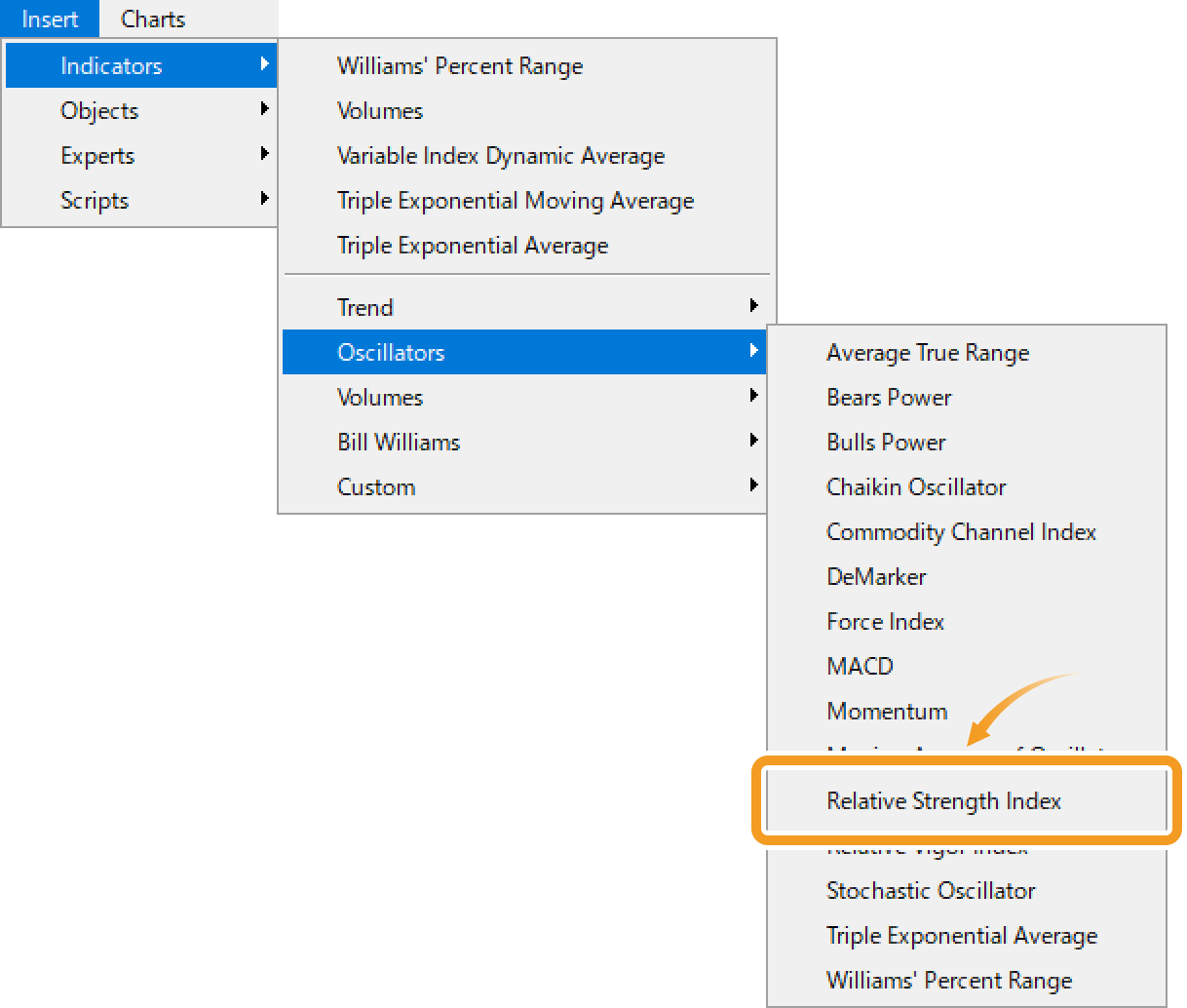
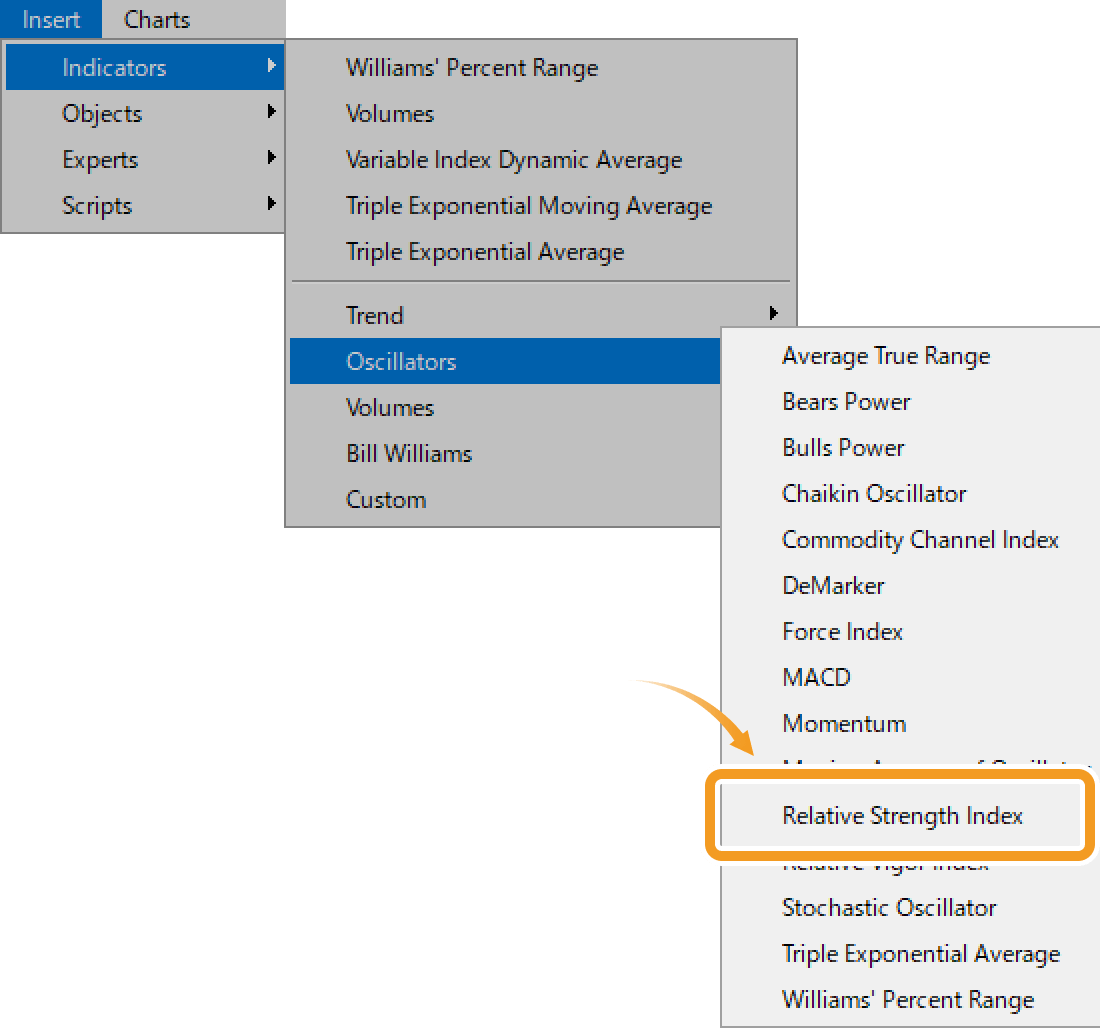
Add RSI from the Navigator
On the Navigator, go to "Indicators" and click on the "+" sign next to "Oscillators". Select "Relative Strength Index" and drag it onto the chart you wish to apply it to.
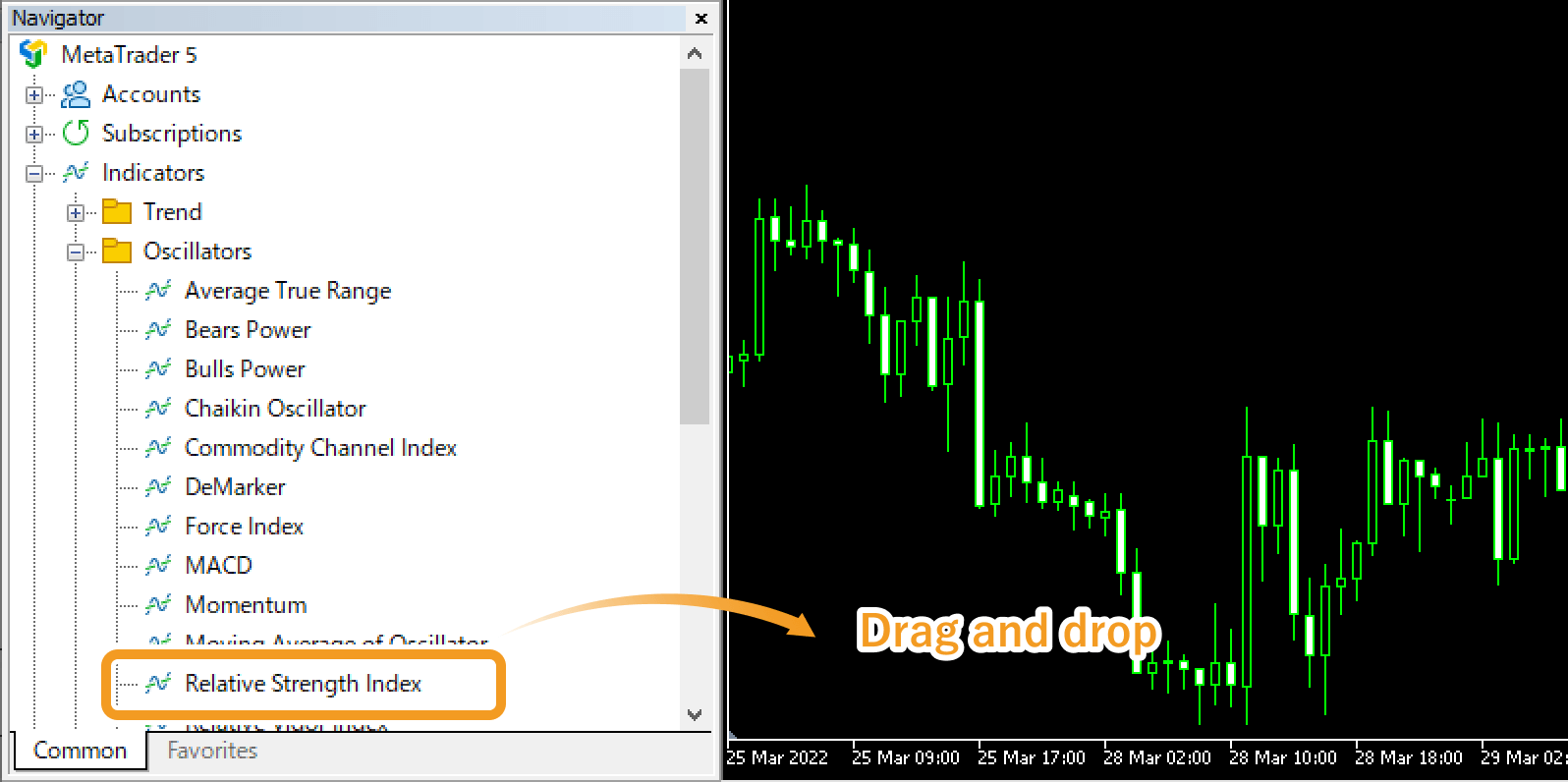
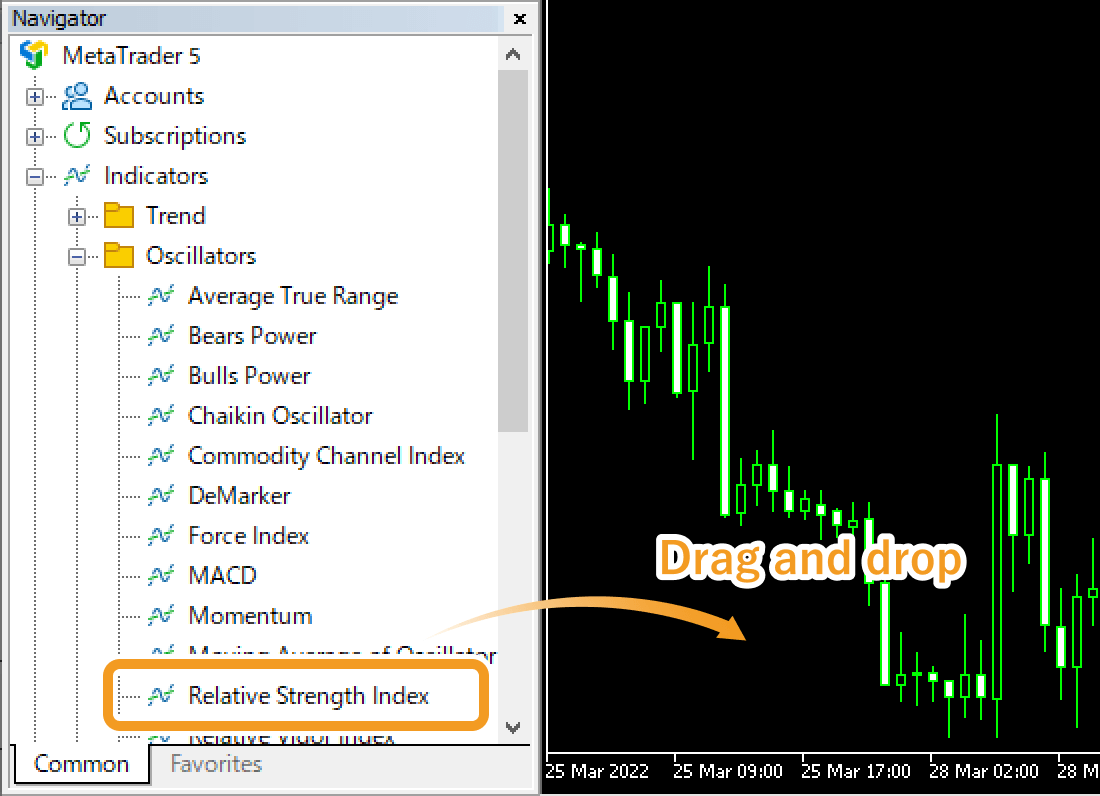
Or, right-click on "Relative Strength Index" and select "Attach to Chart".
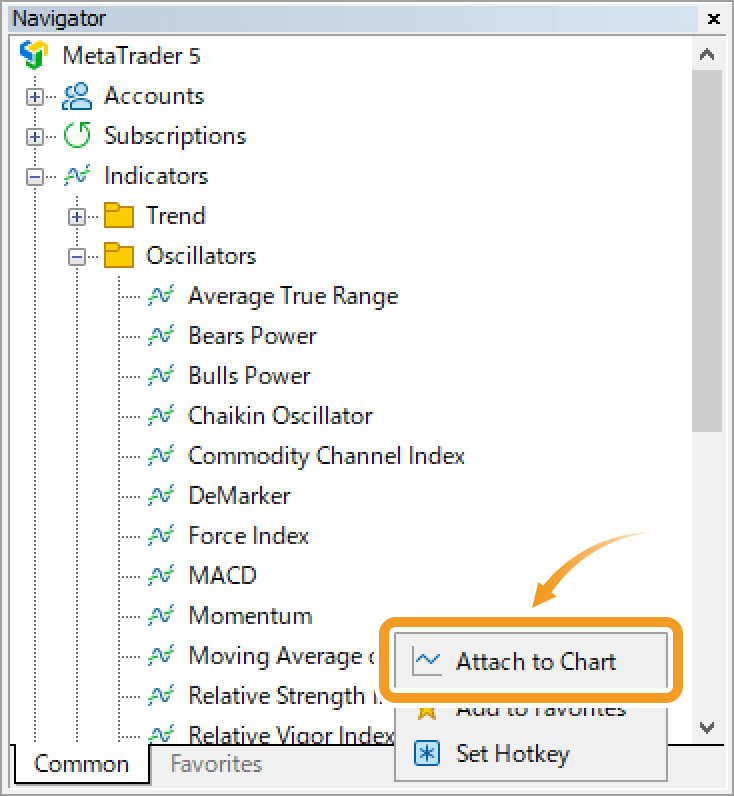
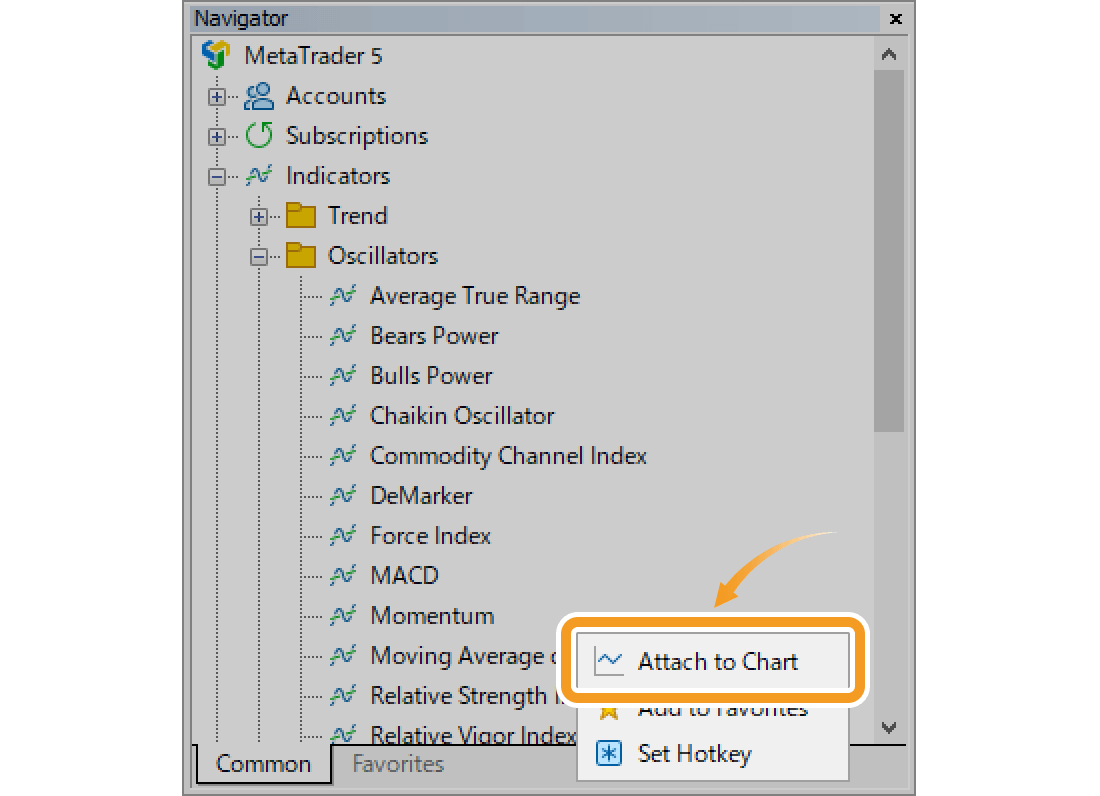
Step 2
The setting window for RSI will appear. Set the parameters in the "Parameters", "Levels", "Scale", and "Visualization" tab and click "OK".
"Parameters" tab
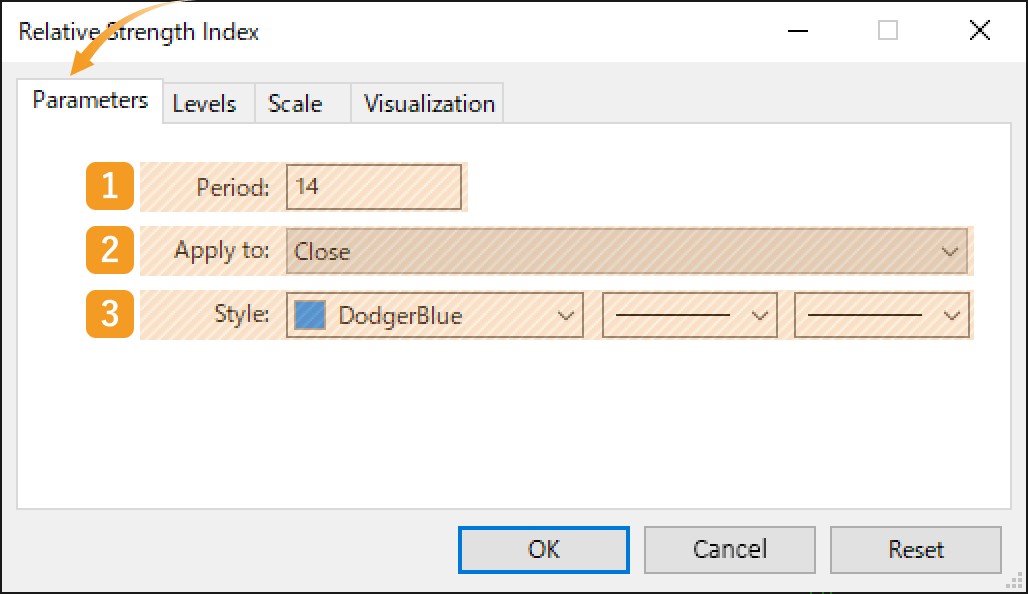
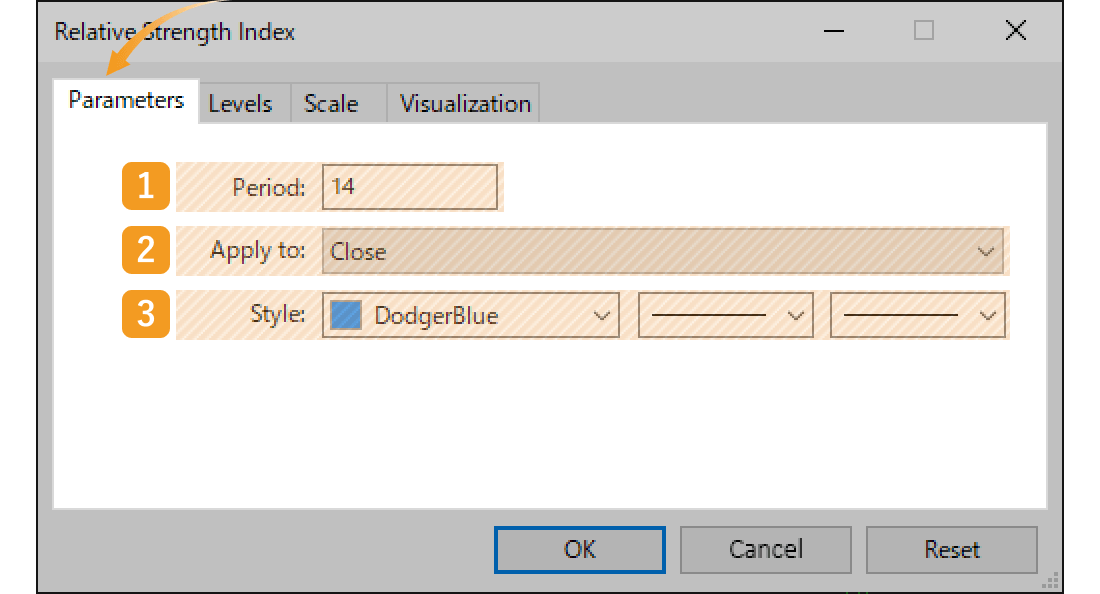
|
Number |
Item name |
Descriptions |
|---|---|---|
|
1 |
Period |
Set the period for the RSI. The unit here is the number of candlesticks. If you select the daily chart and set it to "14", the RSI for the past 14 days will be generated. |
|
2 |
Apply to |
Price to use for calculating RSI. |
|
3 |
Style |
Set the color, line type, and line thickness for RSI. |
Among the options in the "Apply to" field, "Previous Indicator's Data" and "First Indicator's Data" use the values of an indicator displayed in a sub-window, rather than the price of the chart's symbol.
For example, if volume is shown as the first indicator in a sub-window and you select First Indicator's Data, the RSI will be calculated based on the volume.
"Levels" tab
In the RSI sub-window, you can display horizontal lines at given levels. They are set to 30% and 70% by default. If you wish to change them, double-click the numbers and enter the number of your choice.If you want to add another horizontal line, click "Add" and enter the number. RSI fluctuates from 0~100% so pick a number from 0~100.
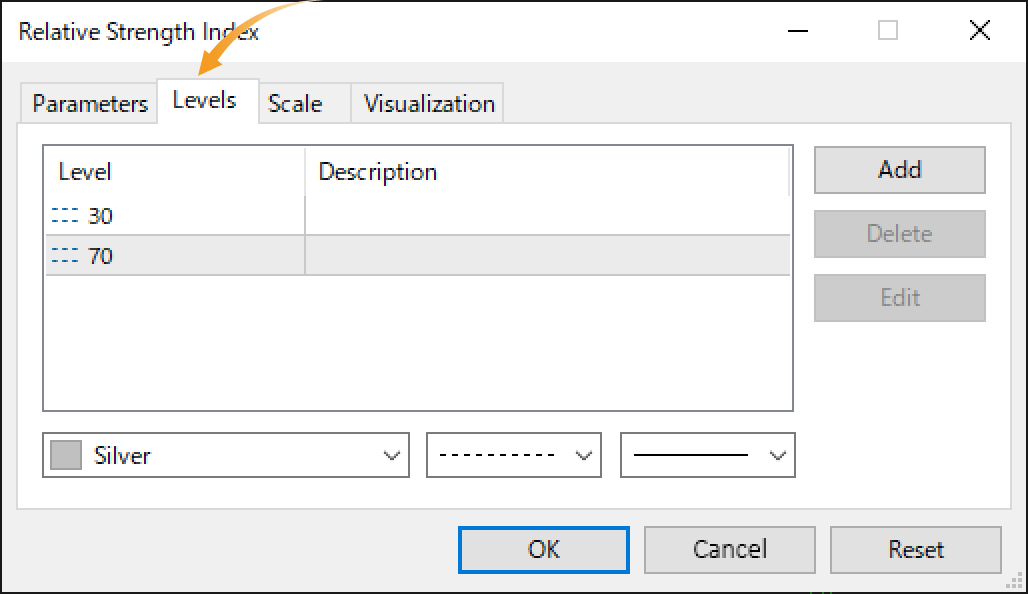
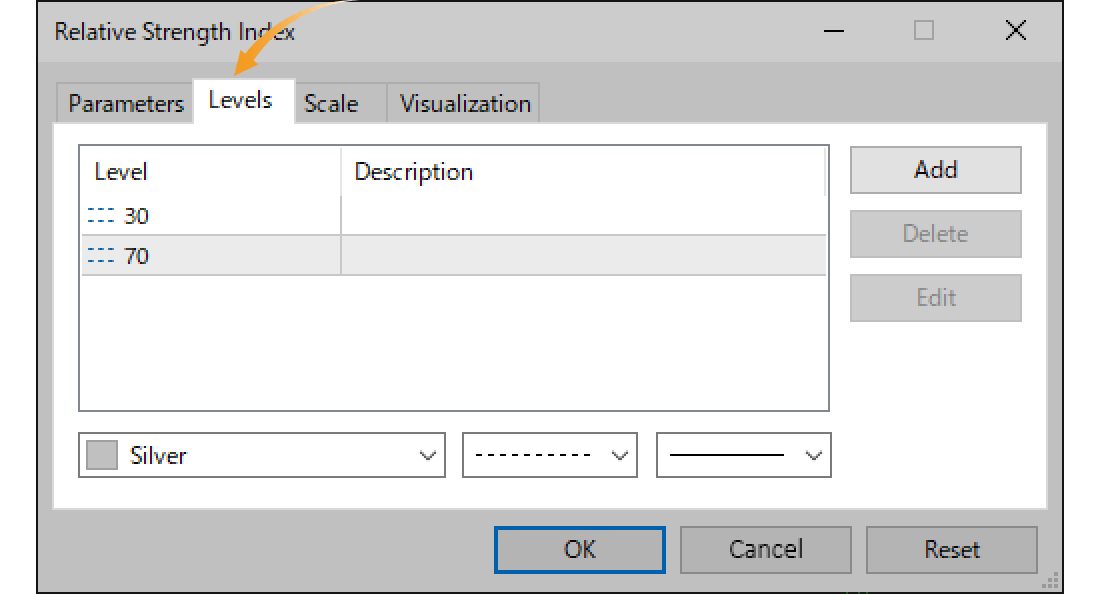
"Scale" tab
Set the scale of the sub-window for RSI.
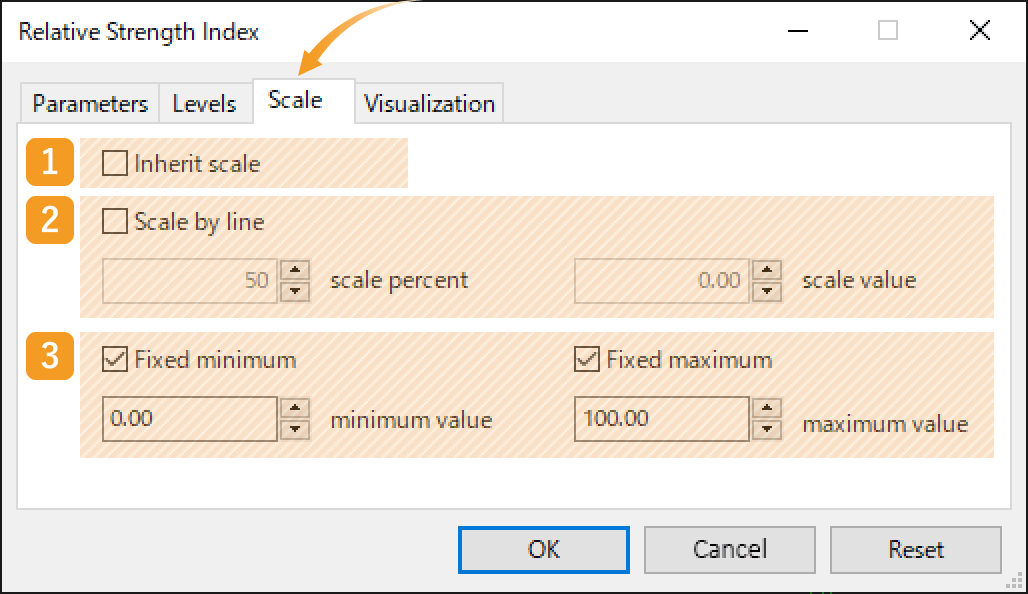
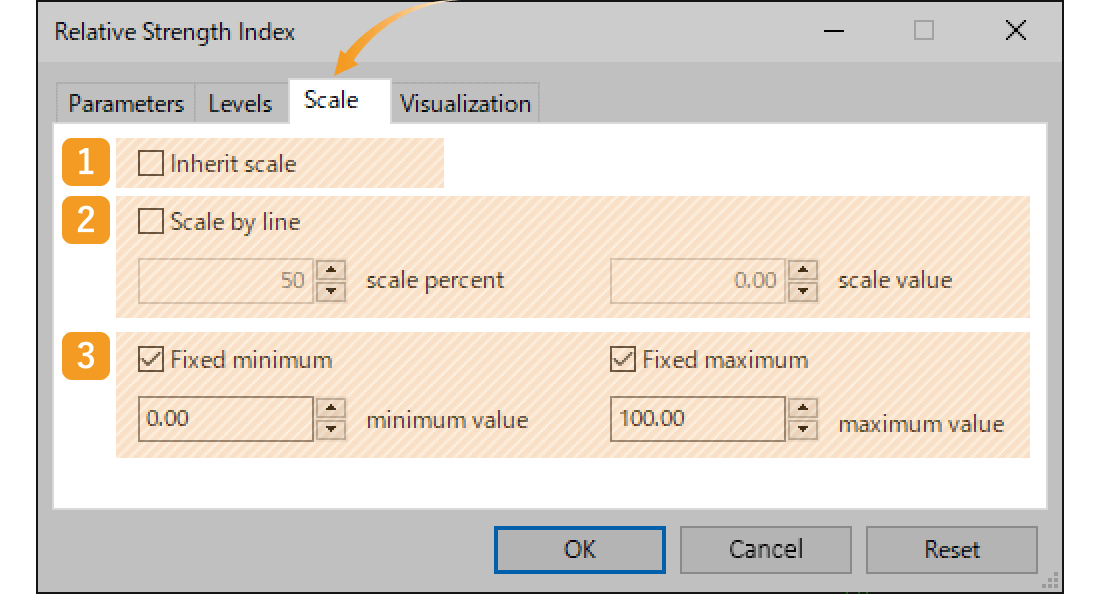
|
Number |
Item name |
Descriptions |
|---|---|---|
|
1 |
Inherit scale |
Check this box if you want to inherit the scale of the previous indicator when displaying multiple indicators on the same sub-window. |
|
2 |
Scale by line |
Specify where you want the RSI to show up on the sub-window. If you set the scale percentage to "50" and the scale value to "0", the scale of the vertical axis will be adjusted so that the scale value of "0" will be set at the 50% mark (max value is 100%). |
|
3 |
Fixed minimum/maximum |
Set the min/max value of the RSI in the sub-window. |
"Visualization" tab
In the "Visualization" tab, you can set the timeframes to display RSI. As RSI can only be displayed in the sub-window, it will be displayed in sub-window even if "Show in Data Window" is unchecked.
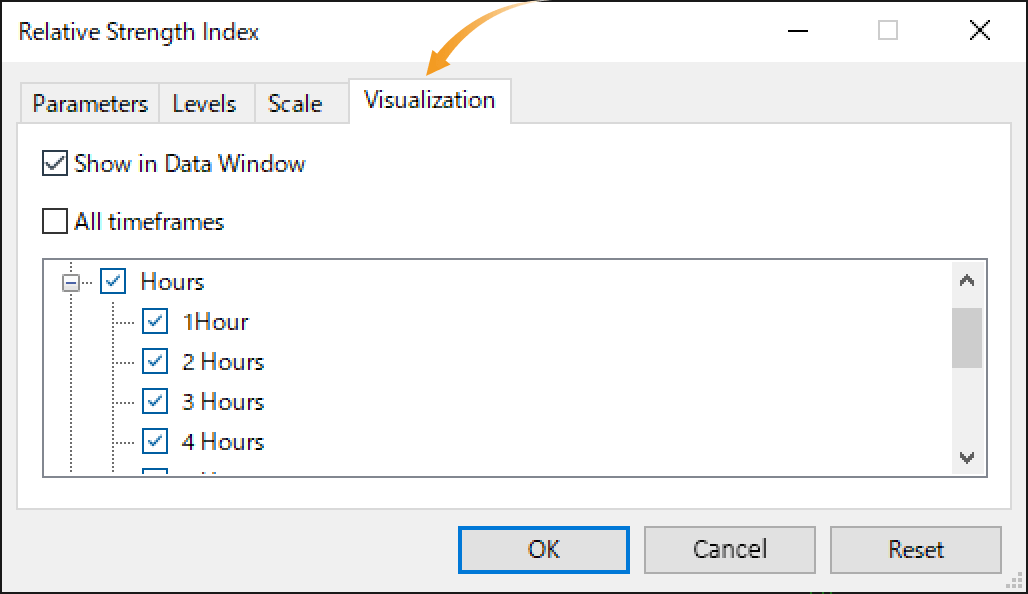
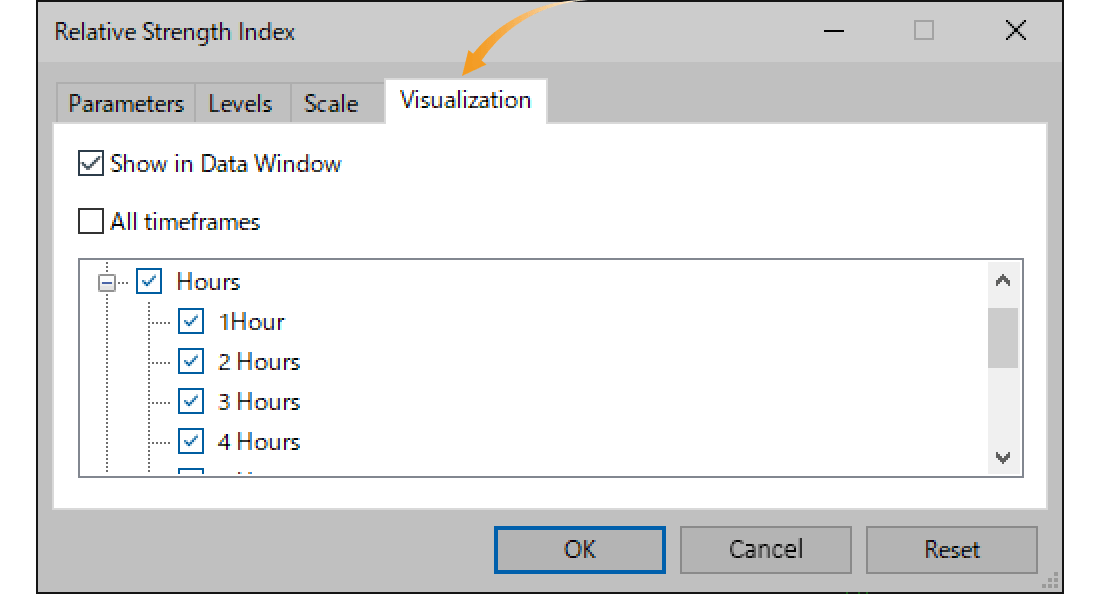
Step 3
RSI will be displayed on the sub-window of the chart.
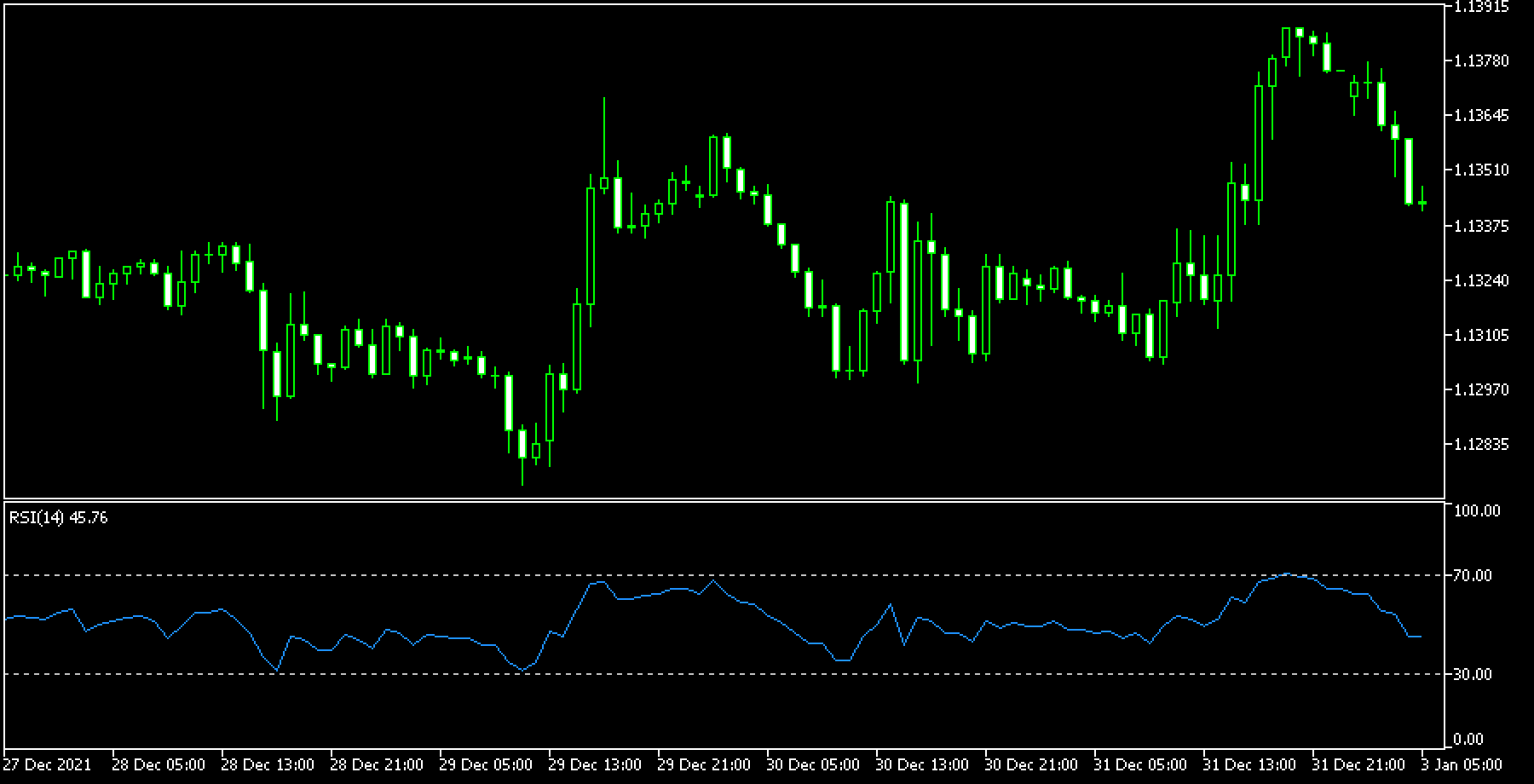
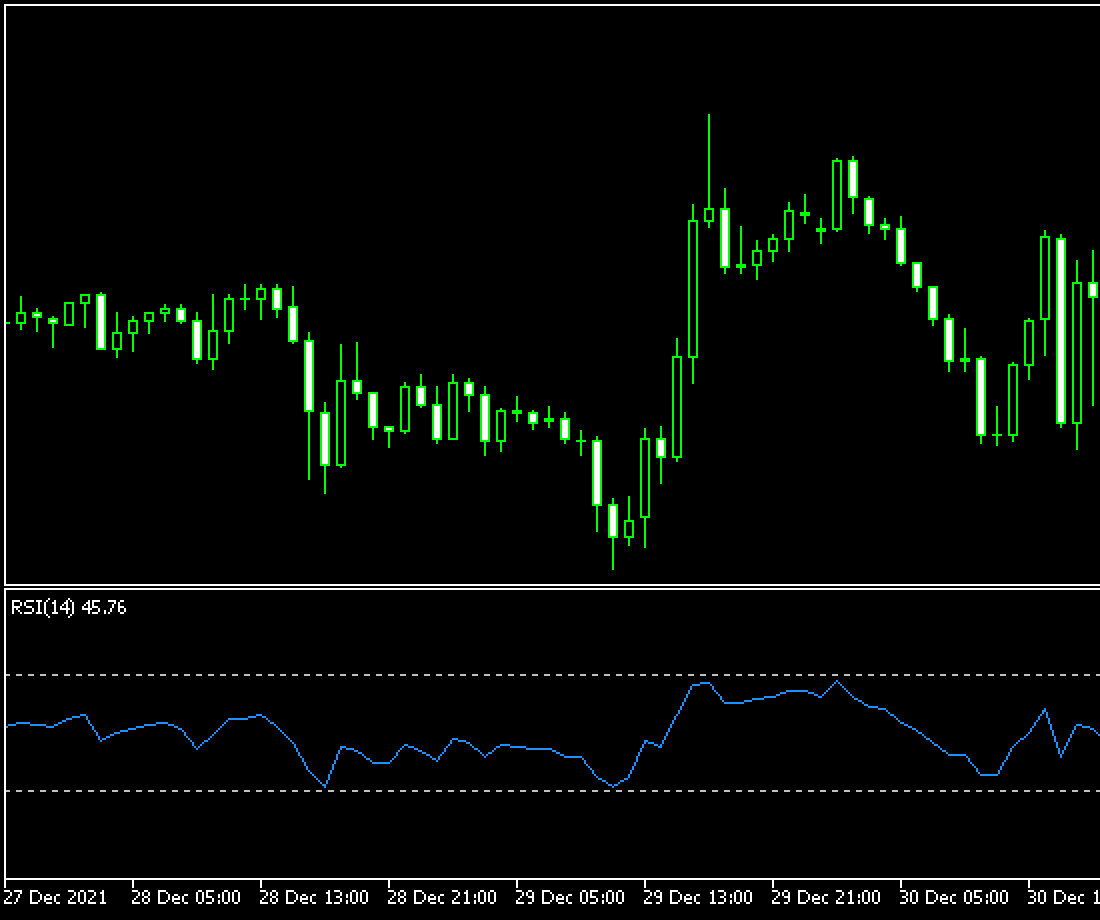
Was this article helpful?
0 out of 0 people found this article helpful.
Thank you for your feedback.
FXON uses cookies to enhance the functionality of the website and your experience on it. This website may also use cookies from third parties (advertisers, log analyzers, etc.) for the purpose of tracking your activities. Cookie Policy
